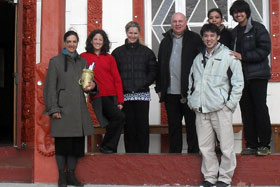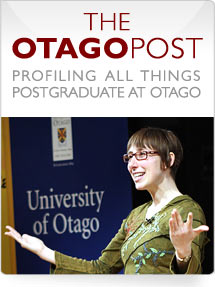 Monday 16 June 2014 3:25pmThe Otago Post issue 9
Monday 16 June 2014 3:25pmThe Otago Post issue 9
Physiotherapy postgraduate students and staff at Otākou marae.
On a cool Spring day a group of Physiotherapy postgraduate students and staff headed out to the Otākou marae to hold an informal physiotherapy clinic for local iwi.
The initiative – a first – was aimed at introducing postgraduate Physiotherapy students to tikanga Māori and building relationships between local iwi and the School of Physiotherapy. An equally important aim for initiator Ricky Bell was to offer free physiotherapy services to community members who don't typically access such health services.
Ricky (Ngāpuhi, Ngati Hine), a distance student from Northland, proved the catalyst for the event. Keen to visit the local marae while in Dunedin for the clinical component of his course, he decided offering a free clinic on the local marae would be a good way of introducing local people to the School's clinical services and his fellow students – most of them international – to a marae.
"The kaupapa of the hui was about whakawhanaungatanga, establishing and building relationships with our people and Te Whare Wānanga o Otago, in particular the School of Physiotherapy,” says Ricky. “It's also well established that Māori are disproportionately represented at the wrong end of the scale on every health indicator. The day was about making our people feel comfortable and what better way to do that than taking our mahi to them in their whare tūpuna.”
Postgraduate programme leader Dr Steve Tumilty, who also attended along with the School's kaiāwhina Katrina Potiki Bryant, said the feedback received on the day was “fantastic” from both students and iwi members.
“One or two people from both sides became quite emotional at the closing speeches. The Indian students gained some new “aunties” and were virtually adopted. I also felt very privileged and was welcomed with the usual warm Māori hospitality.”
Dr Tumilty adds that the School is keen to investigate the possibility of extending involvement with local iwi.
“Exchange of culture as well as approaches to healthcare are possible aims for the future, and involvement of students across the spectrum of postgraduate and undergraduate courses are also topics for discussion.”
“Physiotherapy and (traditional Māori healing technique) Miri Miri are both natural approaches to facilitating the body to heal itself. There must be overlaps in the techniques used and the philosophy behind these approaches; in the future it would also be good to explore common ground and facilitate the integration of these two approaches, which can only be a positive for the healthcare of all New Zealanders.”
Ricky acknowledges the support of Dr Tumilty and Ms Bryant, who made the day possible.
“It's an honour and a privilege that the runaka o Otākou me ngā haukāinga allowed us on to their marae to share with them,” he says. “I'm hoping it will become a recurring event and that it goes some way towards helping our people feel more comfortable with accessing health services."
